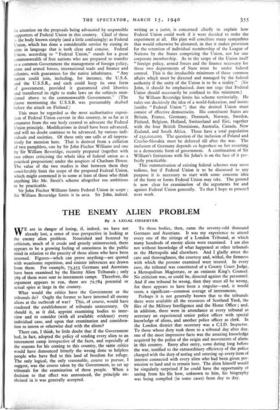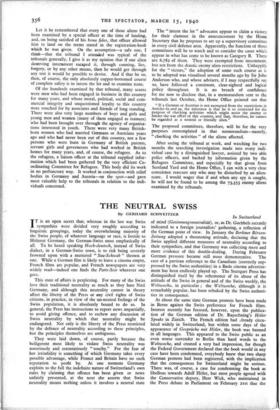THE ENEMY ALIEN PROBLEM
By A LEGAL OBSERVER
WE are in danger of losing, if, indeed, we have not already lost, a sense of true perspective in looking at the enemy alien problem. Nourished and fostered by criticism, much of it crude and grossly uninstructed, there appears to be a growing feeling of uneasiness in the public mind in relation to the paucity of those aliens who have been interned. Figures—whch can prove anything—are quoted with wearisome repetition, and sinister inferences are drawn from them. For example, 73,353 Germans and Austrians have been examined by the Enemy Alien Tribunals ; only 569 of them were sent to internment camps. Therefore, the argument appears to run, there are 72,784 potential or actual spies at large in the country.
What would the critics have the Government or the tribunals do? Ought the former to have interned all enemy aliens at the outbreak of war? This, of course, would have rendered the establishment of tribunals unnecessary. Or should it, as it did, appoint examining bodies to inter- view and to consider (with all available evidence) every individual case, and upon that examination and considera- tion to intern or otherwise deal with the aliens?
There can, I think, be little doubt that if the Government had, in fact, adopted the policy of sending every alien to an internment camp irrespective of the facts, and especially of the reasons for his coming to this country, the same critics would have denounced bitterly the wrong done to helpless people who have fled to this land of freedom for refuge. The only logical, the only reasonable, course to pursue, I suggest, was the course taken by the Government; to set up tribunals for the examination of these people. When a decision to that effect was announced, the principle en- shrined in it was generally accepted. To those bodies, then, came the seventy-odd thousand Germans and Austrians. It was my experience to attend every one of the sittings of a London Tribunal, at which many hundreds of enemy aliens were examined. I am also not without knowledge of what happened at other tribunals in the Metropolis and elsewhere. And I gladly attest the care and thoroughness, the courtesy and, withal, the firmness with which the persons examined were treated. In every case, the tribunal was constituted of a County Court Judge, a Metropolitan Magistrate, or an eminent King's Counsel. No criticism was, or could be, directed against the personnel. And if one tribunal be wrong, then they must all be wrong, for there appears to have been a singular—and, it would seem, a significant—common average of internments.
Perhaps it is not generally known that to the tribunals there were available all the resources of Scotland Yard, the files of the Military Intelligence and the Home Office ; and, in addition, there were in attendance at every tribunal as secretary an experienced senior police officer with special knowledge of aliens, and another police officer as clerk. In the London district that secretary was a C.I.D. Inspector. To those whose duty took them to a tribunal day after day, one of the most impressive facts was the amazing knowledge acquired by the police of the origin and movements of aliens in this country. Entry after entry, some dating long before the war, testified to the extraordinary efficiency of the police charged with the duty of noting and entering up every item of interest connected with every alien who had been given per- mission to land and to remain here. The alien himself would be singularly surprised if he could have the opportunity of seeing from his file how, unknown to him, his biography was being compiled (in some cases) from day to day. Let it be remembered that every one of those aliens had been examined by a special officer at the time of landing, and, on being satisfied of his bona fides, that officer allowed him to land on the terms stated in the registration-book which he was given. On the assumption—a safe one, I think—that the tribunal I attended was typical of the tribunals generally, I give it as my opinion that if one alien deserving internment escaped it, through cunning, lies, forgery, or by any other means, then he would get through any test it would be possible to devise. And if that be so, then, of course, the only absolutely copper-bottomed course of complete safety is to intern the lot and to examine none.
Of the hundreds examined by that tribunal, many scores were men who had been engaged in business in this country for many years, and whose moral, political, social and com- mercial integrity and unquestioned loyalty to this country were vouched for by associates and friends of long standing. There were also very large numbers of boys and girls and young men and women (many of them engaged as trainees) who had been brought over through the agency of organisa- tions interested in youth. There were very many British- born women who had married Germans or. Austrians years ago and who had never been out of this country, not a few persons who were born in Germany of British parents, servant girls and governesses who had worked in British homes for many years, and, of course, the refugees. As to the refugees, a liaison officer at the tribunal supplied infor- mation which had been gathered by the very efficient Co- ordinating Committee for Refugees. This body did its work in no perfunctory way. It worked in conjunction with relief bodies in Germany and Austria—on the spot—and gave most valuable help to the tribunals in relation to the indi- vidual'; concerned. The " intern the lot " advocates appear to claim a victory for their clamour in the announcement by the Home Secretary that he proposes to set un a supervisory committee in every civil defence area. Apparently, the function of those committees will be to watch and to consider the cases which appear in what has come to be known as Category B. There are 6,782 of them. They were exempted from internment, but not from the drastic enemy alien restrictions. Unhappily for the " victors," the adoption of some such course as is to be adopted was visualised several months ago by Sir John Anderson who, and whose advisers, if I may respectfully say so, have followed a consistent, clear-sighted and logical policy throughout. It is no breach of confidence for me now to disclose that, in a memorandum sent to the tribunals last October, the Home Office pointed out that
" If a German or Austrian is not exempted from the restrictions in Articles 6a and 9a, the inference is that he is so restricted for the purpose of checking activities which might assist the enemy or hinder the war effort of this country, and that, therefore, he cannot be regarded as a neutral or friendly alien."
The proposed committees, therefore, will be for the very purposes contemplated in that memorandum—namely, " checking the activities " of the aliens affected.
After seeing the tribunal at work, and watching for two months the searching investigation made into every indi- vidual case by a distinguished lawyer, assisted by two able police officers, and backed by information given by the Refugees Committee, and especially by that given from Scotland Yard and the Home Office, I can with a very clear conscience reassure any who may be disturbed by an alien- scare. I would wager that if and when any spy is caught, he will not be found to be among the 73,353 enemy aliens examined by the tribunals.























































 Previous page
Previous page